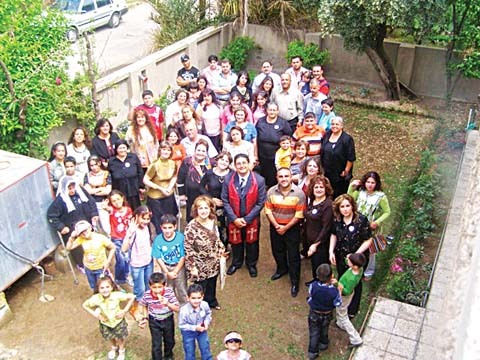Iraq's Hope

Rumor was that during the Sunday evening service of the 2005 General Assembly there would be an important announcement. During the service, it was reported that the Church of the Nazarene was being planted in Iraq and those involved in this endeavor were on the platform.
Spontaneous applause lasting 15 minutes erupted from the assembly while an Iraqi from the city of Basra lifted high his country's flag and waved it for all to see. Then Pastor Aziz from Baghdad was introduced. Robed in traditional Assyrian dress and a feathered hat, he said, 'Thank you for bringing Jesus to my country.'
How did the Church of the Nazarene get started in the country of ancient Babylon and Nineveh where Jonah refused to go? What is happening there today?
When doors started to open for the church to enter Iraq, there were many obstacles. Hundreds of thousands of people were being internally displaced and millions were fleeing to neighboring countries. The infrastructure of the country was nonexistent. People were insecure and afraid to trust those not part of their immediate families.
One of the first Nazarenes to enter the country for the church was a Nazarene elder and building contractor, Dan Dillon, from Nampa, Idaho, First Church. Nazarene Compassionate Ministries (NCM) had recruited him to work with Mission East and World Relief in Kurdish villages not far from Mosul. Their task was to rebuild homes that had been destroyed during the recent conflicts. Dan lived in Dohuk and through his relationships with some local believers he began Bible studies for the Church of the Nazarene. In the fall of 2003, I traveled with friend Tom Gray to Dohuk and was excited to see how God was working there.
Dan took us to Mosul to meet with educators and the other community leaders to discuss how we could help the local schools reopen. We were impressed to see work being done to rebuild schools and prepare classrooms. NCM sent crisis care kits and school backpacks for families and children in Iraq.
On another trip with Rod Green, Eastern Mediterranean Field NCM coordinator, we met Naji, a believer who was a part of Dan's Bible study. Naji's family had been displaced in the late 1980s during the Anfal campaign, a genocide against the Kurdish people which left over 1,100,000 displaced and 4,500 villages destroyed. He relocated in Dohuk with no money to start his tailoring business. NCM provided funds to convert an old garage into a factory and purchased heavy-duty sewing machines so he could restart his business in a neighboring village.
The Church of the Nazarene in Dohuk is now being led by Pastor Arman, a young Iraqi-Armenian from Baghdad. It has grown rapidly, causing them to relocate four times, and now runs over 100 in attendance. Last year the local congregation built a worship center on the second floor of the pastor's home. First Church of the Nazarene in Anderson, Indiana, has adopted the Dohuk church and given sacrificially for the building project and church ministries.
Many Christians who left Iraq carried with them a burden for the people of their country. In 2001, one young believer, Aziz, went to study in Jordan. While in Jordan he met Pastor Khalil of the Ashrafieh Church of the Nazarene. As Pastor Aziz continued his theological studies, Khalil discipled and mentored him.
Many of the refugees said they would never return to Iraq, but Aziz felt the strong call of God to go back to his homeland to plant a Church of the Nazarene.
College Church of the Nazarene in Bourbonnais, Illinois, wanted to help with the Baghdad church plant by providing funds to rent the first church building. First Church of the Nazarene in Harrisonburg, Virginia, has also supported the ministry in Baghdad with prayer and financial support. These partnerships have been invaluable. The church in Baghdad continues to grow, ministering in some very difficult and dangerous circumstances, but Pastor Aziz and his wife, Linda, have continued to serve God and the Church of the Nazarene faithfully in Baghdad.
Refugees from Iraq not only went to Jordan but also to Syria. The Church of the Nazarene in Damascus felt the burden to serve the refugees, by feeding souls and bodies, providing counseling and medical care, and helping educate the children. Although the Nazarene school there was already crowded with Syrian children, the director and teachers opened the 'Acts of God' school, which continues to educate the refugee children each afternoon. Through child sponsorships and contributions from European Nazarenes, this school has been able to remain open.
On a recent visit, Pastor Khalil and I realized that in planting the Church in Iraq, evangelism schools, clinics, and leadership development training were given most of the attention but the initial steps of discipleship had been neglected. We started to strategize about how we could meet this need. Working with Pastor Khalil, in partnership with Evangelism Explosion and EQUIP ministries, a discipleship school has been started.
Revival is also happening in Iraq. At the family camp this past summer, over 40 new seekers came to Christ. Pastors Aziz and Arman, along with Pastor Khalil, baptized 27 of the new disciples who had been attending the discipleship school. The leaders are now challenged to plant new churches throughout the country of Iraq.
Today life in Iraq is still challenging, but many are finding hope in Christ through the ministry of the Church of the Nazarene.
Lindell R. Browning lives in the Middle East and serves as Field Strategy Coordinator for the Eastern Mediterranean Field.
Holiness Today, November/December 2011
Please note: This article was originally published in 2011. All facts, figures, and titles were accurate to the best of our knowledge at that time but may have since changed.




